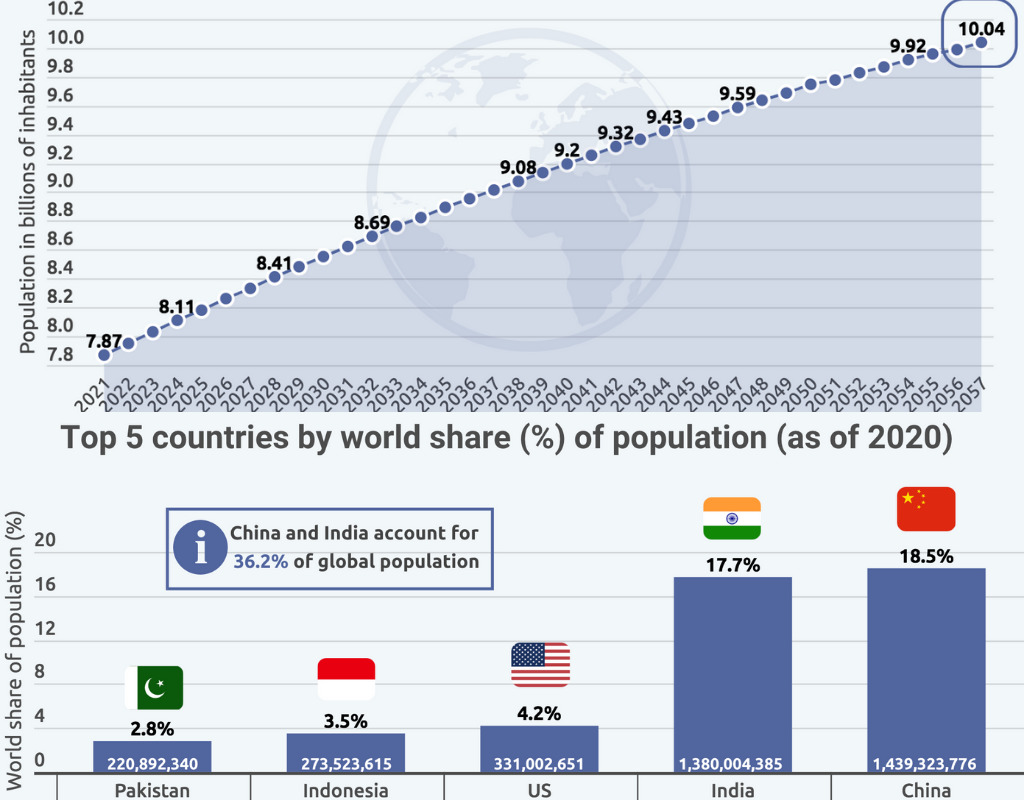3 Mins Read
According to new data, due to improved standards of living, the global population is expected to reach 10.04 billion by 2057, which marks a growth of 27.57% from the current world population of 7.87 billion, with some countries are estimated to record a huge percentage of the world population.
The new figures were released by the U.N. Department of Economic and Social Affairs, Population Division, the data on population growth shows how the the annual projected growth rate is set to decline from 1.03% as of 2021 to 0.4% in 2057.
Leading the Population Boom
In 2020, China and India were responsible for 36.2% of the world population in 2020, with 1.43 billion and 1.38 billion people respectively, with the U.S. coming third and accounting for 4.2% of the global population with 331 million people.
Suggested reasons behind this projected population growth could be influenced by better living standards and healthcare setups in many countries, and the life expectancy rate increases leading to a large aging population and a reduced mortality rate.
There are concerns as well regarding the effect this growth will have on the economy, with experts warning that an increase in birth rates, especially in developing countries, can lead to a scarcity in savings and investments crippling economic development.
On the other hand, if this same rate reduces, the working population will create space for more capital in savings and investments but in countries with a huge aging population, there will be a direct strain on the economy due to a lesser working group and businesses will not be able to meet demand in jobs and to support the vulnerable group, governments will have to invest more capital in healthcare.
Though there is a projected population explosion, the predicted economic growth will be extremely high than the potential for population growth.
In addition, advancements in technology will help push growth by increasing income, improvements in agriculture, and better healthcare systems thus minimizing the threat of mass mortality.
Population and the Climate
The climate agenda especially will be in limelight for the coming decades possibly having an impact on this growth and there is a general opinion, that the growth rate might come to a halt given the concerns of climate change and what this will mean for the vulnerable population. For instance, older people are more likely to face physical effects of extreme heat resulting in an increase in heat-stress mortality. And in other cases, increasing temperatures can result in outdoor air pollution, again affecting the aging population and those with pre-existing health conditions.

Looking at the role governments play in controlling population growth, many believe that this growth can impede economic progress and to stop this from happening, China, for instance, has enforced control measures on the population like the one child per family policy in 1979 as well as providing financial benefits for families with fewer children. However, this has led to a large aging population due to which recently, authorities allowed families to have three children to counter this.
Though the projection shows that the population is expected to grow, the growth rate will depend on several factors. Developed countries have experienced slow growth due to sustained low levels of fertility, but in developing countries, reasons for this will include consistent high child and maternal mortality, violence, conflicts, and the ongoing impact of diseases.
Lead image courtesy of Finbold.




